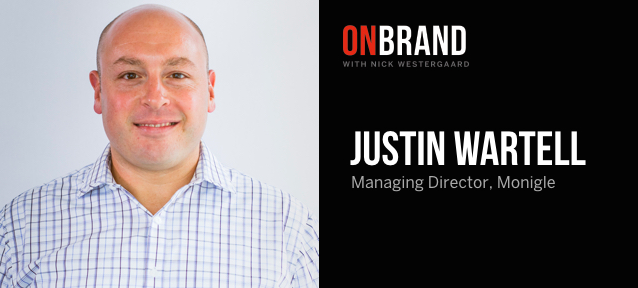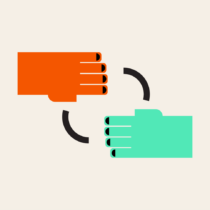“Do You Use the B Word?”: Justin Wartell On Brand

Recently our Managing Director, Justin Wartell, had the opportunity to talk brand with Nick Westergaard on the On Brand podcast. The far-ranging conversation touched on a variety of topics, from when it’s appropriate to leave brand out of certain customer experience touchpoints to a memorable shopping trip at LUSH Cosmetics. Below, the recording in full as well as some of the highlights.

On helping clients unpack all of their attendant industry and organizational baggage
Oftentimes they’re operating within organizations where brand is relegated to the sidelines. So you add to the complicated industry the fact that they’re trying to build something that oftentimes is not terribly well-respected. We spend as much time educating around the potential of brand and the power of brand as we do solving specific brand problems. We view ourselves not just as strategists or storytellers but also educators when it comes to an understanding of brand and its ability to not just look great but to drive the business and be meaningfully connected to business objectives.
On diagnosing where an organization is on the brand sophistication spectrum
It comes down to a handful of pretty simple questions. (1) Does the organization use the ‘B word’ in their regular vernacular? We’ve encountered places where you can’t say ‘brand’ out loud without ruffling feathers. (2) Do we have a clearly defined understanding of brand? Even before you get to what is that organization’s brand, do we even understand what brand is and share a common viewpoint around the role that brand plays in expressing an organization’s business strategy in a very human way? (3) Is there consistency and clarity across all types of levels and responsibilities within the organization of what the enterprise’s brand stands for?
On the importance of ongoing brand education
Brand has to help people to understand what they should do differently tomorrow than they’re doing today. It’s very specifically around the “do.” The education has to be two-way. You have to both share information and collect information. The other piece is, it has to be sustained over the course of time. We have to keep momentum. It starts to integrate itself into more-frequent situations where employees are learning about what it means to deliver the brand and deliver behaviors.
On defining brand experience
Experience is about the residue brands leave with people when the product experience, the service experience, the interpersonal interaction is gone. You can go buy laundry detergent at Walmart, you can buy it at Target, and you can buy it at Whole Foods. After you walk out of the store you’ve accomplished the functional element of getting that laundry detergent, but after each those experiences, the thing that’s left over after you’ve got that product is very different depending on where you walked in. What do I want to leave people with once they’re done with their interaction with me?
On how the Denver Broncos brand goes beyond football
What’s so intriguing about sports brands is that most of the fanaticism that exists, most of the brand advocacy and loyalty, has nothing to do with the event itself. The lion’s share of those interactions are happening for people who have never entered the stadium. In working with the Broncos, we were helping to reframe what brand meant for the organization. Their brand is a grand unifier within the Denver and Front Range community. What we were trying to unlock was the confidence and perspective of delivering that community-first orientation, as opposed to what they’re stereotypically associated with, which is the game of football.


